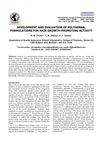 January 2017 in “Korean Journal of Pharmacognosy”
January 2017 in “Korean Journal of Pharmacognosy” Modified red ginseng extract promotes hair growth and has antioxidant and anti-inflammatory effects.
1 citations,
November 2022 in “Journal of pharmaceutical negative results” Alopecia areata is an autoimmune condition causing patchy hair loss, with treatments focusing on immune system regulation and hair regrowth.
 January 2024 in “Journal of Biosciences and Medicines”
January 2024 in “Journal of Biosciences and Medicines” Future treatments for androgenic alopecia may focus on reactivating hair follicle stem cells and improving drug delivery.
 November 2024 in “Plants”
November 2024 in “Plants” Et-BB3-CMU rice bran extract may be a promising natural option for promoting hair growth and preventing hair loss.
 November 2024 in “Skin Appendage Disorders”
November 2024 in “Skin Appendage Disorders” Misinformation about alopecia can lead to poor treatment, so it's important for healthcare professionals to correct myths.
 November 2024 in “Applied Sciences”
November 2024 in “Applied Sciences” Placenta products might help with hair loss, but more research is needed.
 14 citations,
January 2007 in “Journal of Dermatological Treatment”
14 citations,
January 2007 in “Journal of Dermatological Treatment” Minoxidil solution had low effect, causing 99% to stop using it.
 59 citations,
May 2014 in “Expert Opinion on Therapeutic Targets”
59 citations,
May 2014 in “Expert Opinion on Therapeutic Targets” The document concludes that targeting 5α-reductase, the androgen receptor, and hair growth genes, along with using compounds with anti-androgenic properties, could lead to more effective hair loss treatments.
 October 2021 in “Cosmoderma”
October 2021 in “Cosmoderma” Hair loss can be managed with treatments like minoxidil, finasteride, and others, but there are still gaps in effectiveness and off-label usage is increasing.
 May 2022 in “Journal of the Egyptian Women's Dermatologic Society (Print)”
May 2022 in “Journal of the Egyptian Women's Dermatologic Society (Print)” Women's hair loss can be due to hormonal changes and various conditions, with treatments focusing on stopping progression and managing symptoms.
 48 citations,
May 1999 in “International Journal of Dermatology”
48 citations,
May 1999 in “International Journal of Dermatology” Alopecia areata is an unpredictable autoimmune hair loss condition, treated based on severity, with half of patients regrowing hair within a year without treatment.

Betamethasone dipropionate lotion is more effective than minoxidil solution for treating Alopecia Areata.
 38 citations,
July 1989 in “Archives of dermatological research”
38 citations,
July 1989 in “Archives of dermatological research” Testosterone causes hair loss in AGA mice, which are good for testing baldness treatments, and both minoxidil and cyproterone acetate can prevent this hair loss.
 August 2024 in “Frontiers in Pharmacology”
August 2024 in “Frontiers in Pharmacology” Antibody treatments show promise for hair loss but need more research.
 October 2024 in “International Journal of Research in Medical Sciences”
October 2024 in “International Journal of Research in Medical Sciences” The SULT1A1 enzyme booster improves minoxidil effectiveness in treating hair loss, especially in females.
 October 2024 in “Dermatologic Surgery”
October 2024 in “Dermatologic Surgery” PRP and PRF show promise for hair growth but need more research for consistent and safe use.
 November 2024 in “Clinical Cosmetic and Investigational Dermatology”
November 2024 in “Clinical Cosmetic and Investigational Dermatology” Rosemary oil may effectively treat hair loss with fewer side effects, but more research is needed.
 51 citations,
October 1980 in “The New England Journal of Medicine”
51 citations,
October 1980 in “The New England Journal of Medicine” Minoxidil lowers blood pressure effectively but may cause unwanted hair growth and other side effects.
 90 citations,
November 1980 in “Annals of Internal Medicine”
90 citations,
November 1980 in “Annals of Internal Medicine” Long-term use of minoxidil for high blood pressure can delay kidney failure in some patients and improve kidney function in others with severe hypertension.
 95 citations,
December 1980 in “The New England Journal of Medicine”
95 citations,
December 1980 in “The New England Journal of Medicine” Minoxidil helped bald patient regrow hair.
 45 citations,
January 1981 in “Annals of Internal Medicine”
45 citations,
January 1981 in “Annals of Internal Medicine” Minoxidil controls blood pressure effectively, but may cause side effects like hypertrichosis.
 December 2018 in “Evidence-Based Practice”
December 2018 in “Evidence-Based Practice” Topical minoxidil 1% and 2% are twice as effective as placebo for female pattern hair loss.
 16 citations,
March 2017 in “Journal of inclusion phenomena and macrocyclic chemistry”
16 citations,
March 2017 in “Journal of inclusion phenomena and macrocyclic chemistry” Minoxidil mixed with 2-hydroxypropyl-β-cyclodextrin in water can improve hair growth more than minoxidil alone.
 9 citations,
January 2009 in “International Journal of PharmTech Research”
9 citations,
January 2009 in “International Journal of PharmTech Research” The polyherbal oil with Eclipta alba, Hibiscus rosa sinensis, and Nardostachys jatamansi was found to be highly effective in promoting hair growth, better than minoxidil.
 35 citations,
August 1980 in “Circulation”
35 citations,
August 1980 in “Circulation” Minoxidil may cause heart issues in animals and humans.
 1 citations,
May 1999 in “Journal of The European Academy of Dermatology and Venereology”
1 citations,
May 1999 in “Journal of The European Academy of Dermatology and Venereology” Treat hair loss with medicine, continue indefinitely.
 January 2017 in “Springer eBooks”
January 2017 in “Springer eBooks” Over 40% of postmenopausal women experience hair loss, with treatments aiming to stop further loss and possibly thicken hair.
 September 2023 in “Medicine”
September 2023 in “Medicine” Herbal extract spray improved hair growth in a man with hair loss.
 3 citations,
January 2011 in “Journal of biologically active products from nature”
3 citations,
January 2011 in “Journal of biologically active products from nature” The F1 herbal mixture grew hair well and could treat hair loss without the side effects of common treatments.
Hair care products can cause skin irritation and allergies.




























